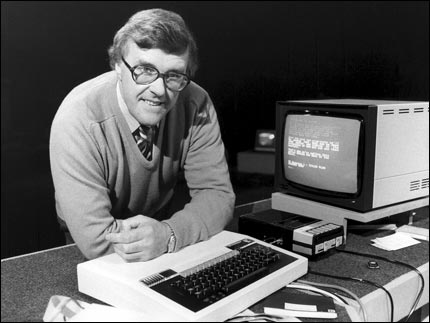The long dark tea time of the computer programmer
The way in which Information Technology is taught in England is so dull and harmful it should be scrapped – that’s the view of the Education Secretary Michael Gove.
‘A nation of digital illiterates’ (BBC)
Many years ago there was a total corporate take-over of the computer software sector in the UK. Big money was to be made out of controlling the profits generated by software applications, which were protected from competition by incompatible and inoperable standards and the force of law. (An attempt by the UK government to establish a very modest requirement for open standards was successfully killed off last week.)
One of the most painful aspects of this take-over was the way in which the same corporations managed to deform the entire education system into serving their purposes. All things resembling actual computer programming were cleansed from the curriculum, which was instead packed with dire, tedious training modules for drilling students in how to use those self-same corporations’ big software suites.
Back in the 1980s, before this take-over, I learned to program on the BBC Micro, which was widespread throughout the UK at the time. There is good evidence that this was the reason there has been such a strong software industry in the UK over the last three decades.
Let’s just use the words of computer games pioneer Ian Livingston from his February 2011 report:
“Given that the new online world is being transformed by creative technology companies like Facebook, Twitter, Google and video games companies, it seems incredible that there is an absence of computer programming in schools. The UK has gone backwards at a time when the requirement for computer science as a core skill is more essential than ever before. When Sir Clive Sinclair launched the ZX Spectrum in 1982, affordable computers were eagerly purchased for the homes of a creative nation. At the same time, the BBC Micro was adopted as the computer platform of choice for most schools and became the cornerstone of computing in British education in the 1980s. There was a thirst for creative computing both in the home and in schools creating a further demand at universities for courses in computer science. This certainly contributed to the rapid growth of the UK computer games industry.
“But instead of building on the BBC’s Computer Literacy Project in the 1980s, schools turned away from programming in favour of ICT. Whilst useful in teaching various proprietary office software packages, ICT fails to inspire children to study computer programming. It is certainly not much help for a career in games. In a world where technology affects everything in our daily lives, so few children are taught such an essential STEM skill as programming. Bored by ICT, young people do not see the potential of the digital creative industries. It is hardly surprising that the games industry keeps complaining about the lack of industry-ready computer programmers and digital artists.”
The official Government response was mostly public relations, mentioning developments that have nothing to do them such as Raspberry Pi, which, incidentally, appears to be an attempt by Livingston’s generation to recreate the 1980s when we once watched computers on TV (instead of watching TV on computers).
While this change in Government policy is absolutely vital, it is odd the way the people lobbying for it haven’t branched outside of their narrow fields of computer games and computer graphics – which are ultimately little more than a game of shifting pixels around on a VDU, utilizing very mature technologies based on software applications developed by large corporations.
They’re missing the point: This is the era of smart energy monitors that need to be coupled to microcontrollers that do something with appliances over the internet in response to data. Or robotrading bank accounts that use live data feeds to monitor and execute your share portfolio while you’re watching Corrie. The focus should be on Arduinos and simple robotics to control the energy use in your house, or on creative programming to trump the hedgefunders.
Recently I have been doing experiments through the interface of a home-built 3D printer, completely bypassing their UI application to drive it directly through the serial port.
Here is my first result:
Come on guys. I know it takes years to mastering the ability to render the perfect series of CGI frames of a spoon stirring the brown liquid in a cup of tea. But get a computer controlled robot to actually make me a cup of tea — that would be something!


I think Douglas Adams already pointed out the incomputability of making a good cup of tea!
Seriously though: Games development is in some respects actually much harder (and requires much deeper understanding) than robotics. In a game you would have to model the physics of the fluid in the cup (using Navier-Stokes equations) as well as program a virtual robot that is able to do what your physical robot would do…